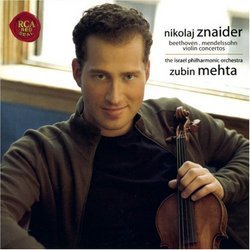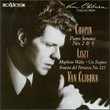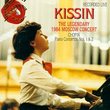Znaider in Mendelssohn & Beethoven: Patrician Subtlety, Res
Dan Fee | Berkeley, CA USA | 12/17/2005
(5 out of 5 stars)
"Of course we violin concerto lovers have been following Nikolaj Znaider since his debut concerto disc for EMI, playing the Nielsen & Bruch (1st) violin concertos. His presentation is impeccable in a way that can only remind us listeners of the late and great - but allegedly too cool and removed - Jascha Heifitz. Next we got the Prokofiev 2nd violin concerto and the Glazunov, topped off with a ravishing but entirely unsentimentalized reading of the Tchaikovsky Meditation. By the second release, Znaider had jumped ship, from EMI to RCA / BMG. Now presumably BMG is Sony BMG. I haven't heard the third BMG / RCA release of violin encores with piano, since to be frank that sort of repertoire typically puts me off unless it is really being played as an encore at the end of a concert or recital. All encores have the appeal of bon-bons; to me one at a time is quite enough, even if I am fighting off a depressive day.
Among the honorific banners trailing behind this young adult phenomenon are first prizes in both the Carl Nielsen 1992 competition, and the 1997 Queen Elizabeth. UN-like so many competition first prize winners, Nikolaj Znaider has not yet peaked as an artist and as a musician, however much he may continue to display high and astounding talents on the violin.
Oh yes, another clue: Znaider plays a Strad (the ex-Liebig 1704) - on loan to him through the Royal Danish Theater, funded by two Danish corporation foundations. (Vellux, and Hojgaard)
As schools of violin playing go, then, Znaider is old money, not nouveau rich.
Worrisome for me are Znaider's partners on this disc. I have not always found Zubin Mehta to be inspired in all his efforts. Neither have I consistently liked the Israel Philharmonic on disc. For one thing, their hall acoustic at the Mann Auditorium in Tel Aviv has frequently sounded too dry, too lacking resonance, with a boxy and constricted impact as recorded. I also have thought I too often heard fiddle-faddle competency from this conductor or this orchestra when I dearly wanted to hear heart or mind or song.
The disc of course began to change my mind and soothe away my quibbles from the first moment.
Bravo to whomever took the entirely apt choice of putting the Mendelssohn concerto first on this disc, although of course the marketing people are pushing the Beethoven on the cover. Just that little detail suggests much - that, for example, somebody was actually paying thoughtful attention to musical order.
Putting the Mendelssohn first also suggests that perhaps musical considerations continued to exercise influence, even after the recording equipment was turned off in Tel Aviv. Bravo again, then.
An audience anecdote of 2005 has it that, when Znaider appeared in Chicago to play the Mendelssohn with the Chicago Symphony under Daniel Barenboim, the second half of the program was the Mahler Fifth Symphony. Having performed as the soloist in the first half of the concert, Znaider then slipped discreetly into the last row of the first desk violin section where he proceeded to join everyone in the whole of the Mahler that followed.
The sheer easefulness or capability which these details suggest is rather winsomely on display in the Mendelssohn. The violin tone Znaider spins has a consistent platinum light, especially in the upper reaches. He somehow reminds me in those moments of one of my very favorite older violinists, Henryk Szeryng. (1918-1988) The association with Heifitz comes mainly via the extreme facility and wide range of Znaider's superb technical abilities. Just enough of a hint of hot tone remains for the strings vibrating under Znaider's fingers that you realize that even platinum is born in furnace fires for both jewelers and scientists. Think alchemy.
Nor is this performance marred by either conductor or band.
Zubin Mehta is awake and listening, apparently in every bar. So he renews his credentials as a musician who has not fallen yet again into bored professionalisms. This is no mean feat when you pause to consider how many times a successful world class conductor must do Beethoven over the years. The written notes never change much, but undeniably the music does. So also is the Israel Philharmonic on this disc. Nobody is workmanlike in the lesser sense, nor are they asleep as the music passes by, page after page after page.
At least on this one disc, the dry and deadly box of the Mann Auditorium does not haunt the achieved sound. It would appear that at least this one time, engineers Andreas Neubronner, Stephan Schellmann and others have somehow managed to exorcise those ghosts of Christmases past.
All to the good; none of the expected difficulties of conductor, orchestra, or venue materialize.
This leaves Znaider to lift everything to higher plane all together. Just hear how Znaider plays the old, familiar Kreisler cadenzas for the Beethoven as if he were making them up.
There is nothing eccentric about these interpretations. All the fire and the flash and the superlative easefulness simply serve profoundly musical ends, ever second of every bar of the music. For that reason, it may be that some will tend to underestimate what Znaider is doing here. After all, he makes it all sound so completely within his instrument's grasp, so fluent. Znaider's musical style leans more towards elegance, subtlety, and patrician warmth than to display as such. One suspects that violin display soon leaves the listening room, neglected, bored to tears at the lack of opportunities for fiddle grandstanding. With a smile we might recall that at the premiere of the Beethoven, the fiddler Clements played an interpolated composition of his own, reversing his grip and playing his fiddle upside down to wow the crowd. The Beethoven survived that debut, just imagine. Highly recommended. Have no fears on this one."
There are Better Ones
John B. Wolff | Ann Arbor, Michigan | 12/04/2005
(3 out of 5 stars)
"Znaider takes separate bows much too often, typical of many younger players today. Even the turns have every single note given a separate bow. All that excess in the right arm department turns, what should be a beautiful singing line, into little groups of notes and phrasing goes out the window much too often. Many of the first notes (and sometimes the last!) of a phrase are so soft they are barely audible at normal listening levels...and that bothers me. I had to turn the volume up just to make sure he was remembering to play them. There are some well done artistic fingerings, but not always in the right place. The last movement is taken so fast that any musical ideas of worth are vitiated by the tempo. That is the sort of tempo that makes for train wreaks. The Beethoven is just another Beethoven. There are many that are much worse and some that are very much better. Mehta could have made this all much better.
I have performed the Mendelssohn so many times that I would not have purchased this if a friend had not asked me what I thought. If one wants a Mendelssohn in modern sound, then the one by Shaham and Sinopoli is very good. I will try to remember to come back and update this with a suggestion for Mendelssohn. Most folks will be pleased with Shaham.
Perhaps you might like to try a different Beethoven. You might do yourself a favor and buy Wolfgang Schneidderhan with Jochum and the Berlin. The violin is favored too much for me but just imagine yourself on the podium and the sound balance becomes quite normal. Conductors often walk out into the empty seats to hear the balance. If only recording engineers would do the same. This will probably be deleted soon so buy it now. I hope you enjoy it as much as I have. Don't be worried because this was recorded in 1962. The sound is just fine."
Who knew you could reinvent the Mendelssohn?
Andrew Song | Ontario, Canada | 12/15/2007
(5 out of 5 stars)
"Znaider does something remarkable in this recording: he gives a reading of the Mendelssohn that is not only filled with lyricism, passion, and expression (just like every other recording since the dawn of time), but one that is personal, unique, and most importantly, different from anything I've heard thusfar (and, to date, I've amassed over 20 recordings of this piece, plus hearing numerous recordings on the radio, etc.). Znaider has always been a good musician, but until now I hadn't really heard anything incredibly remarkable or inspiring from him. In fact, this recording has made me go back and relearn this age-old concerto again, discovering many new things that I had not thought about before. Every note Znaider plays is thought out meticulously, and the result is simply breathtaking. For instance, the cadenza is one page of music that every violinist knows off the top of their head, yet Znaider manages to play it in a new and exciting way, bringing intensity, suspense, and serenity to a tired piece of music. The ricochet back into the orchestral tutti manages to float above everything, almost as if it was flying carefree above the recapitulation. Znaider has really done something magical with the Mendelssohn here. Other recommended recordings include the Perlman/Haitink recording, Vengerov paird with Masur, and the Kennedy/Tate disc.
The Beethoven on this disc is also an excellent interpretation, though it's not my favourite. Nothing is particularly flawed with Znaider's playing, it's just that I envision the concerto differently than he does. Mehta does an superb job at controlling the orchestra (in both pieces), creating a perfect pairing between soloist and accompaniment. My favourite recording of the Beethoven Concerto thus far is Schneiderhan with Jochum at the podium, with the Fancescatti/Walter recording a close second. Znaider/Metha produce an above-average recording here, but it's nothing compared to the new heights the Mendelssohn reaches.
Buy this disk for the revolutionary Mendelssohn, but enjoy the Beethoven while you're at it."

![header=[] body=[This CD is available to be requested as disc only.]](/images/attributes/disc.png?v=15401716)
![header=[] body=[This CD is available to be requested with the disc and back insert.]](/images/attributes/disc_back.png?v=15401716)
![header=[] body=[This CD is available to be requested with the disc and front insert.]](/images/attributes/disc_front.png?v=15401716)
![header=[] body=[This CD is available to be requested with the disc, front and back inserts.]](/images/attributes/disc_front_back.png?v=15401716)

 Track Listings (6) - Disc #1
Track Listings (6) - Disc #1





